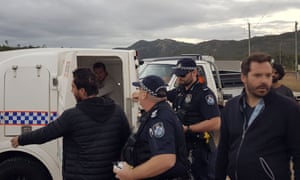Queensland Council of Civil Liberties says banning them reporting near Carmichael mine ‘entirely inappropriate’
Bail conditions imposed on four French journalists – banning them
from reporting near Adani’s Carmichael mine site – are an “abuse of
police power” and “entirely inappropriate”, says the head of the Queensland Council of Civil Liberties.
Michael Cope, a lawyer in Queensland for more than 30 years, says he has never heard of the sorts of bail conditions imposed after protests at Adani’s Abbot Point coal terminal on Monday.
The French journalists, including well-known reporter Hugo Clément, whose arrest has sparked concerns about press freedom in Queensland, were ordered by police not to go within 20km of the Carmichael mine site in central Queensland.
Cope said the condition appeared designed to “shield the company”
rather than meet the purposes of bail as set out in state legislation.Michael Cope, a lawyer in Queensland for more than 30 years, says he has never heard of the sorts of bail conditions imposed after protests at Adani’s Abbot Point coal terminal on Monday.
The French journalists, including well-known reporter Hugo Clément, whose arrest has sparked concerns about press freedom in Queensland, were ordered by police not to go within 20km of the Carmichael mine site in central Queensland.
“The legitimate purposes of bail are to make sure a person appears in court, make sure they don’t interfere with the course of justice and to make sure there’s no risk of reoffending.
“A bail condition that people not go back to the protest site is not unusual. But for police to take into account the interests of the company in a way that is not designed to achieve those (bail) objectives is entirely inappropriate, it’s an abuse of their power.”
Cope also criticised police for not first attempting to move the journalists, or issuing a “move on” direction. The group was filming the protest, was not warned before being arrested, and quickly identified themselves as journalists to police.
“We’ve already expressed our concern about journalists being arrested for doing their job. The appropriate way to deal with a journalist is to hopefully politely ... give them a direction to move on. To simply arrest people is completely over the top. It’s heavy-handed and inappropriate. They shouldn’t then be prevented from doing their work.”
Guardian Australia requested comment from police, including why they chose to arrest the journalists without prior warning and without issuing a “move on” direction designed to prevent arrests in such a circumstance. The direction allows police to require people, who are otherwise not breaking the law, to leave a particular location, including a railway.
Police were also asked whether they had been in contact with Adani regarding the protest at Abbot Point. They refused to comment on the case.
“As the trespass matters will be heard in court, it would be inappropriate to provide detailed comment at this time,” a police spokesman said.
The journalists’ union, the Media Entertainment and Arts Alliance, has written directly to the Queensland premier, Annastacia Palaszczuk, demanding the charges be dropped.
“It is egregious that journalists should be subject to a total exclusion zone that curtails their right to report and only further infringes on the public’s right to know,” the MEAA chief executive, Paul Murphy, said.
“At a time when Australia’s reputation as a nation that upholds press freedom is already damaged, the actions of Queensland police have only gone to attract more unwelcome attention. The actions of Queensland police were heavy‐handed and unworthy of a healthy functioning democracy that upholds press freedom.”
Ordered to leave town
Two activists arrested at the same protest opted to remain in the watch house overnight to have their bail conditions set by a magistrate. On Tuesday the magistrate ordered them not to enter the town of Bowen, where they had been staying.Both women have no criminal record. The activist group Frontline Action on Coal (Flac) said they were both staying in the Bowen area and had to leave because of the conditions.
Flac released a statement on Tuesday quoting the two women, claiming the condition was an “oppressive restriction of our freedom of movement.
“It feels like they’re using our bail conditions as a form of punishment. What happened to innocent until proven guilty?”
A Flac spokesperson said: “Restricting people from entering entire townships is ludicrous. Not only were these protesters acting in a peaceful manner, but this atypical bail condition is unfair to those who have never committed such an offence before.”

No comments:
Post a Comment